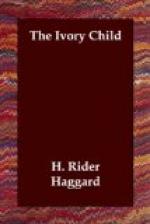“You say that, but you don’t believe it. Oh! you are very transparent, Mr. Quatermain—at least, to me.”
So, hurriedly enough, for these subjects seemed to be uncomfortable, even dangerous in a sense, I began to talk of the first thing about Africa that I remembered—namely, of the legend of the Holy Flower that was guarded by a huge ape, of which I had heard from a white man who was supposed to be rather mad, who went by the name of Brother John. Also I told her that there was something in it, as I had with me a specimen of the flower.
“Oh! show it me,” she said.
I replied that I feared I could not, as it was locked away in a safe in London, whither I was returning on the morrow. I promised, however, to send her a life-sized water-colour drawing of which I had caused several to be made. She asked me if I were going to look for this flower, and I said that I hoped so if I could make the necessary arrangements. Next she asked me if there chanced to be any other African quests upon which I had set my mind. I replied that there were several. For instance, I had heard vaguely through Brother John, and indirectly from one or two other sources, of the existence of a certain tribe in East Central Africa—Arabs or semi-Arabs—who were reported to worship a child that always remained a child. This child, I took it, was a dwarf; but as I was interested in native religious customs which were infinite in their variety, I should much like to find out the truth of the matter.
“Talking of Arabs,” she broke in, “I will tell you a curious story. Once when I was a little girl, eight or nine years of age—it was just before that kind of awakening of which I have spoken to you—I was playing in Kensington Gardens, for we lived in London at the time, in the charge of my nurse-governess. She was talking to some young man who she said was her cousin, and told me to run about with my hoop and not to bother. I drove the hoop across the grass to some elm trees. From behind one of the trees came out two tall men dressed in white robes and turbans, who looked to me like scriptural characters in a picture-book. One was an elderly man with flashing, black eyes, hooked nose, and a long grey beard. The other was much younger, but I do not remember him so well. They were both brown in colour, but otherwise almost like white men; not Negroes by any means. My hoop hit the elder man, and I stood still, not knowing what to say. He bowed politely and picked it up, but did not offer to return it to me. They talked together rapidly, and one of them pointed to the moon-shaped birthmark which you see I have upon my neck, for it was hot weather, and I was wearing a low-cut frock. It was because of this mark that my father named me Luna. The elder of the two said in broken English:
“‘What is your name, pretty little girl?’
“I told him it was Luna Holmes. Then he drew from his robe a box made of scented wood, and, opening it, took out some sweetmeat which looked as if it had been frozen, and gave me a piece that, being very fond of sweet, I put into my mouth. Next, he bowled the hoop along the ground into the shadow of the trees—it was evening time and beginning to grow dark—saying, ‘Run, catch it, little girl!’




